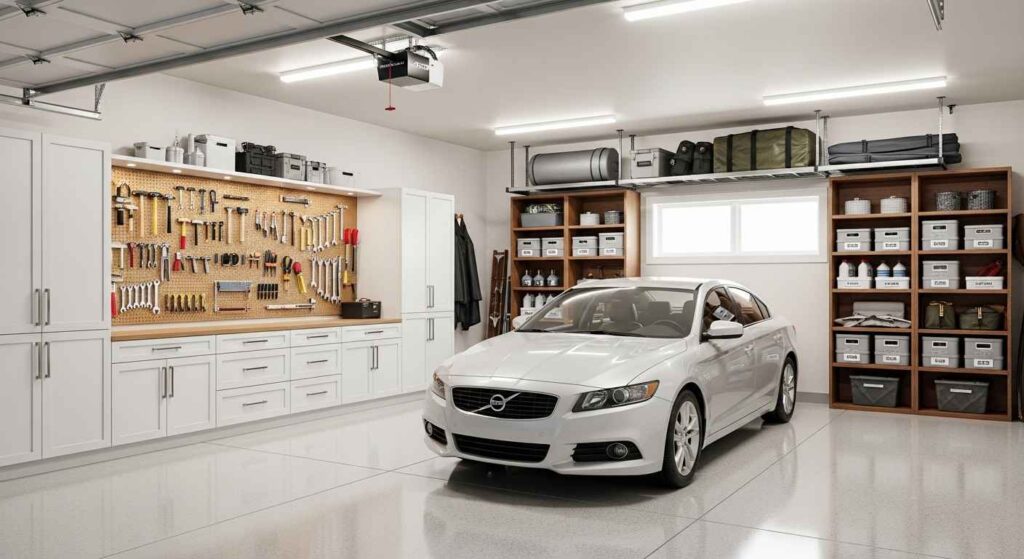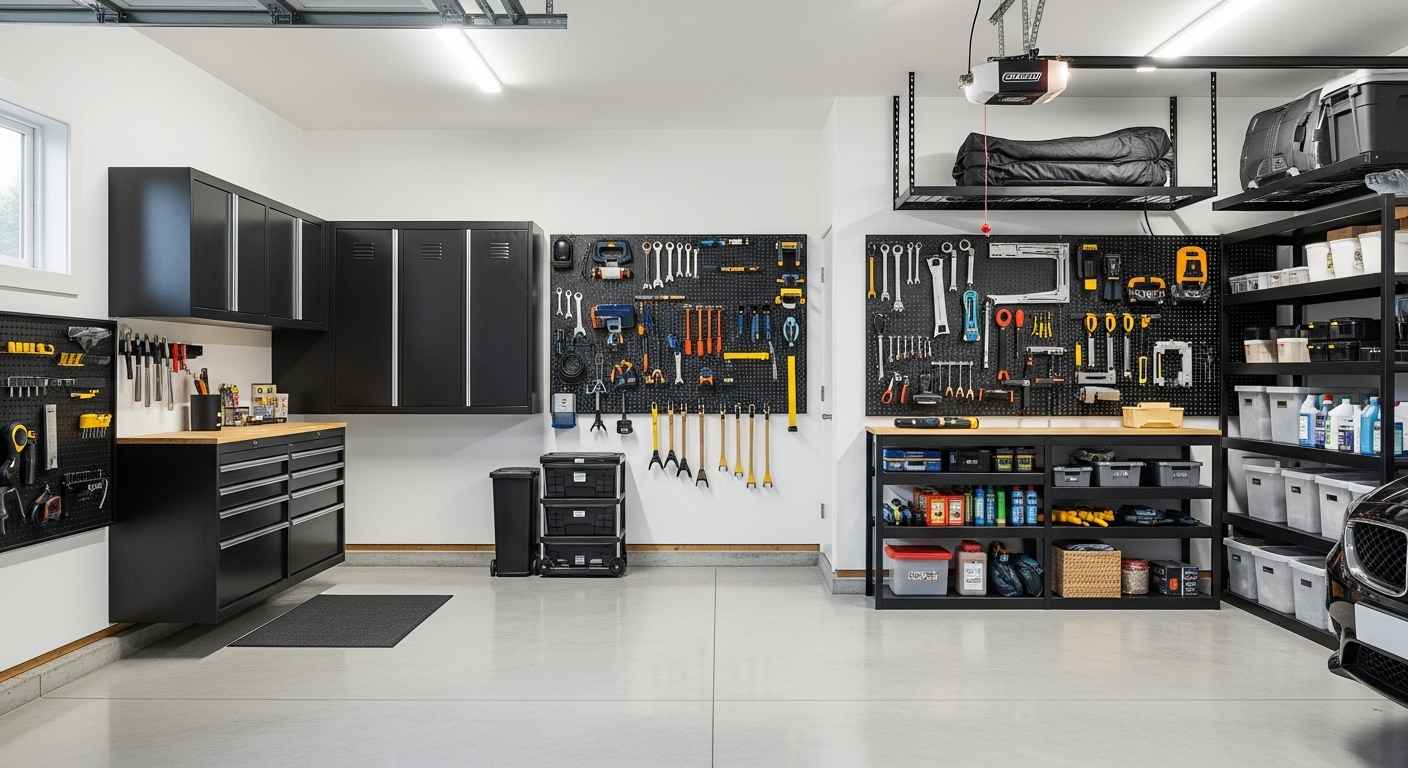Your garage doesn’t have to be a dumping ground for everything you can’t fit in your house. The right storage system can turn your chaotic garage into a well-organized space that actually works for your family.
After testing dozens of garage storage solutions and analyzing what actually keeps garages organized long-term, we’ve found the systems that deliver real results. This guide covers wall-mounted cabinets, overhead racks, pegboard systems, and modular shelving that stand up to daily use.
You’ll learn which storage types work best for different garage sizes, how to choose systems that grow with your needs, and simple installation tips that prevent common mistakes. No matter your budget or DIY skill level, there’s a storage solution here that will work for your garage.
Why Most Garage Organization Attempts Fail
Most homeowners start garage organization with good intentions but end up with the same mess six months later. The problem isn’t lack of motivation – it’s choosing the wrong storage approach.
Single storage methods rarely work because garages hold such diverse items. You need different solutions for seasonal decorations, sporting goods, garden tools, and automotive supplies. A pegboard alone won’t handle Christmas trees. Overhead racks can’t organize small hardware.
Successful garage organization requires three elements: vertical storage for maximum space use, easy access to frequently used items, and systems that can adapt when your storage needs change.
The 4 Essential Types of Garage Storage Systems
Wall-Mounted Cabinet Systems
Wall-mounted cabinets keep your most valuable items secure and dust-free. The Husky 3-Piece Welded Storage System stands out for its sturdy build, high-quality steel, and soft-close door hinges.
Best for: Power tools, automotive fluids, seasonal items, anything you want protected from dust and humidity.
Key features to look for:
- Heavy-duty steel construction
- Soft-close hinges that prevent slamming
- Adjustable shelves for flexibility
- Lockable doors for security
Installation tip: Always locate wall studs and use appropriate anchors. Most cabinet systems require at least two studs for proper support.
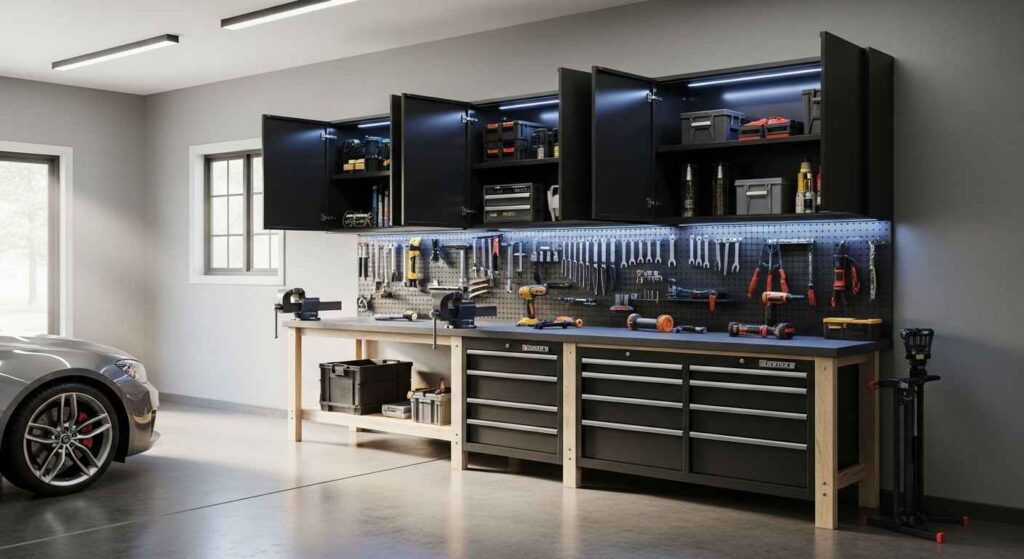
Overhead Ceiling Storage Racks
Overhead racks maximize garage space by using ceiling area and work especially well when you park cars in the garage and have limited floor space.
Best for: Seasonal items, camping gear, holiday decorations, storage bins, anything used less than monthly.
Load capacity considerations:
- Standard racks: 300-600 pounds
- Heavy-duty systems: Up to 1,000+ pounds
- Always check your ceiling joist capacity
Installation requirements: Ceiling rafters are essential for proper installation to ensure the rack is secured properly.
Safety note: Keep frequently used items below shoulder height. Reserve overhead storage for items you access seasonally.
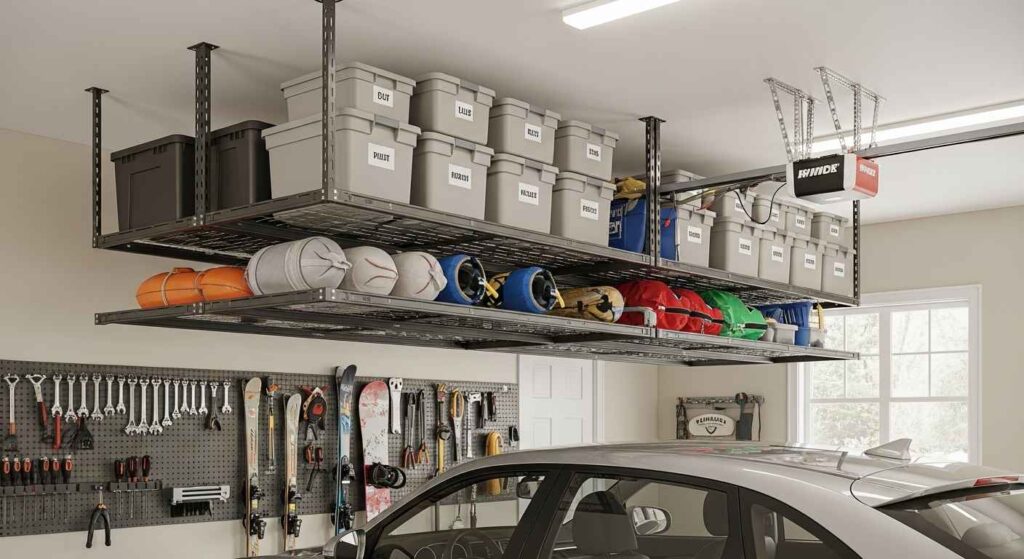
Pegboard Wall Systems
Wall pegboards offer the most versatile garage storage solution because they’re easy to reconfigure as needed – just pull out the pegs and insert them elsewhere.
Best for: Hand tools, garden equipment, cleaning supplies, sports equipment, anything that hangs well.
Pegboard material options:
- Metal pegboard: Most durable, handles heavy tools
- Wood pegboard: Less expensive, good for lighter items
- Plastic pegboard: Moisture-resistant, good for damp garages
Organization tips:
- Group similar tools together
- Use bins for small parts
- Label everything clearly
- Leave room for growth
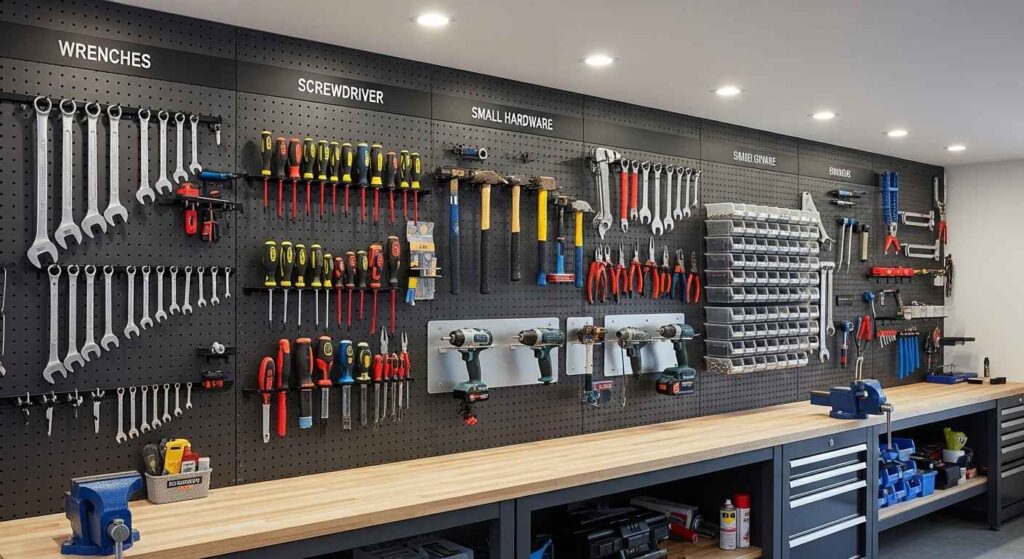
Modular Shelving Units
Modular shelving grows with your storage needs and works in garages of any size. You can start small and add sections over time.
Best for: Paint cans, gardening supplies, automotive fluids, storage bins, anything that sits well on shelves.
Material comparison:
- Steel shelving: Strongest, handles heavy items, rust-resistant when powder-coated
- Plastic shelving: Lighter weight, won’t rust, good for lighter storage
- Wire shelving: Allows air circulation, good for damp garages
Shelving safety: Always anchor tall units to walls to prevent tipping.
How to Choose the Right Storage System for Your Garage
Assess Your Storage Needs
Before buying any storage system, catalog what you need to store. Walk through your garage and group items by:
- Frequency of use: Daily, weekly, monthly, seasonal
- Size and weight: Small tools vs. lawn equipment
- Storage requirements: Needs protection vs. can handle exposure
- Access needs: Quick grab vs. long-term storage
Consider Your Garage Layout
Single-car garage (12×24 feet): Focus on vertical storage. Combine wall-mounted cabinets with pegboards. Skip overhead racks if ceiling height is under 8 feet.
Double-car garage (24×24 feet): Use all storage types. Install cabinets and pegboards on side walls. Add overhead racks over non-parking areas.
Three-car garage (36×24 feet or larger): Create dedicated zones for different activities. Consider a full garage organization system with workbenches.
Budget Planning
Budget-friendly (Under $500):
- Basic pegboard system
- Wire shelving units
- DIY overhead racks
Mid-range ($500-$1,500):
- Quality modular shelving
- Basic cabinet system
- Professional overhead racks
Premium ($1,500+):
- Complete cabinet systems
- Heavy-duty overhead storage
- Professional installation
Installation Tips That Prevent Common Problems
Finding and Using Wall Studs
Most garage storage systems require mounting to wall studs for safety. Use a stud finder and mark all studs before starting installation.
Stud spacing in garages: Typically 16 or 24 inches on center When studs don’t align: Use a strong backing board between studs
Proper Weight Distribution
Never exceed manufacturer weight limits. Distribute weight evenly across mounting points. For heavy items, use multiple anchors.
Weight capacity reality check:
- Wall-mounted systems: Check individual shelf and total system limits
- Overhead racks: Factor in ceiling joist capacity
- Pegboards: Individual hook limits matter more than board limits
Common Installation Mistakes to Avoid
Mounting too high: Keep frequently used items between shoulder and waist height. Inadequate anchoring: Always use appropriate fasteners for your wall type. Ignoring garage door clearance: Ensure storage doesn’t interfere with door operation. Forgetting about car doors: Leave adequate clearance for vehicle doors to open fully.
DIY vs. Professional Installation
DIY-Friendly Systems
- Basic pegboards
- Wire shelving
- Simple wall-mounted units
- Lightweight overhead racks
Required tools: Drill, level, stud finder, appropriate bits and anchors
Professional Installation Recommended
- Heavy-duty overhead systems
- Multiple cabinet installations
- Anything requiring electrical work
- Complex modular systems
Professional installation benefits: Proper mounting, warranty protection, faster completion, expertise in problem-solving.
Maintaining Your Garage Storage System
Regular Maintenance Tasks
Monthly: Check for loose fasteners, clean shelves and bins, reorganize as needed. Quarterly: Deep clean pegboards, inspect weight limits, rotate seasonal items. Annually: Check mounting hardware, reorganize based on usage patterns, consider system updates.
Preventing Common Problems
Rust prevention: Use rust-resistant materials in humid climates. Keep metal surfaces clean and dry. Overloading: Regularly check weight limits. Redistribute items if shelves start sagging. Access issues: Keep frequently used items in easy-reach zones. Review your organization quarterly.
Storage System Combinations That Work
The Complete Garage Setup
For maximum organization, combine storage types strategically:
Wall zones:
- Upper cabinets for rarely used items
- Mid-level pegboard for daily tools
- Lower shelving for frequently accessed supplies
Ceiling zones:
- Overhead racks for seasonal storage
- Keep 7+ feet clearance over parking areas
Floor zones:
- Rolling carts for portable organization
- Floor-to-ceiling units in corners
Small Garage Solutions
When space is limited, focus on multi-purpose storage:
- Wall-mounted workbench that folds down
- Ceiling racks that don’t interfere with parking
- Slim rolling carts that fit between cars
Seasonal Storage Strategies
Holiday and Seasonal Items
Overhead racks work perfectly for seasonal storage of holiday decorations and camping gear. Use clear bins with labels for easy identification.
Best practices:
- Store off-season items overhead
- Use vacuum-sealed bags for bulky items
- Label everything with contents and season
- Keep inventory lists on phone or computer
Sports Equipment Rotation
Create seasonal zones that rotate based on activities. Summer sports equipment moves to accessible areas while winter gear goes to long-term storage.
Cost-Effective Storage Solutions
Budget-Friendly Options
DIY overhead racks: Build simple ceiling storage for under $100 using lumber and basic hardware. Repurposed materials: Old kitchen cabinets work great for garage storage. Progressive building: Start with basic systems and upgrade over time.
When to Invest More
High-use items: Spend more on storage for tools and supplies you use daily. Valuable items: Invest in secure, weather-resistant storage for expensive equipment. Long-term solutions: Quality systems cost more upfront but last decades.
Final Recommendations
The best garage storage system is one you’ll actually use. Start with your most pressing storage problems and build your system gradually.
For most homeowners: Combine wall-mounted cabinets, pegboards, and basic shelving. This trio handles 90% of garage storage needs.
For serious DIYers: Add overhead racks and specialized tool storage. Consider workbench integration.
For minimal maintenance: Choose powder-coated steel systems with simple hardware. Avoid complex mechanisms that can break.
Your garage can become a functional space that supports your family’s activities and hobbies. The key is choosing storage systems that match your specific needs and maintaining them consistently.
Remember to check internal links to related closet organization ideas and organization systems that work for comprehensive home organization solutions.
